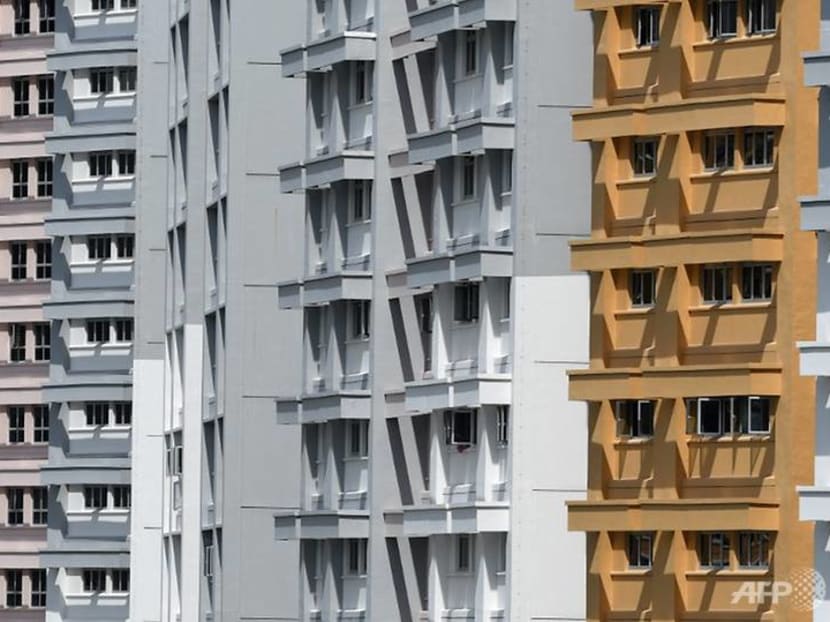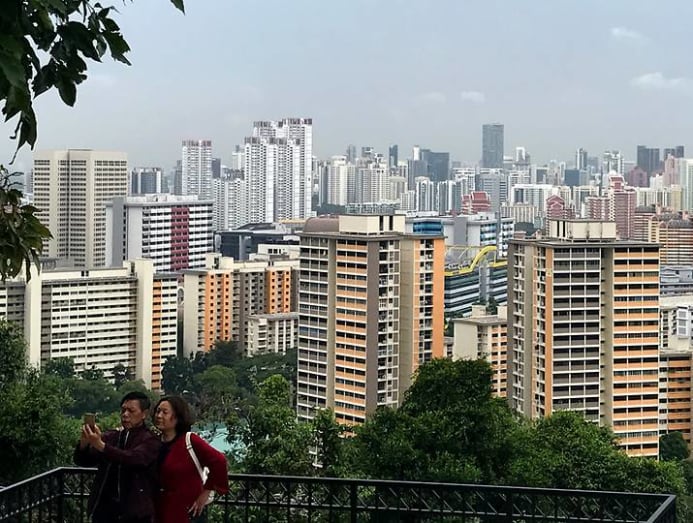commentary Commentary
Commentary: Paying it forward and how being a good neighbour can go a long way

A general view shows newly occupied Housing Development Board (HDB) public residential flats in Singapore on Mar 5, 2018. (File photo: AFP/Roslan Rahman)
SINGAPORE: Having just recently shifted, I’ve become more aware of the importance of building strong neighbourly relations.
Shortly after moving into our new home, my youngest son fractured his arm, and two weeks later, I suffered a bad ankle sprain.
As he was off school for three weeks, we sometimes went downstairs together to grab lunch. We must have been quite a sight, as many neighbours – most of whom I’ve never met – stopped to ask if we needed help.
One lady offered her ankle guard to me, and even the uncle who sells carrot cake made sure to deliver our orders right to our table.
The random acts of kindness were heart-warming to say the least. At the same time, moving house in such an unprecedented historical moment has also made me realise how difficult it can be to make new friends.
READ: Commentary: We cannot allow COVID-19 to disrupt our relationships too
Part of this arises when safe distancing makes physical exchanges lumbering. I’ve had more than a few conversations in the lift with my new neighbours where I could barely make out what they were saying, and all I could muster was a nod and a smile.
Sometimes children can show us the way on overcoming social awkwardness.
Since we moved into a new neighbourhood, my boys have made firm friends with other peers in the area, and they look forward to their playground time every evening.
While I’m still getting to know the neighbours around us, what has encouraged me are the close friendships I’ve enjoyed with my previous neighbours, one of whom has even helped babysit my kids for brief periods.
READ: Commentary: The circuit breaker was a time many of us want to forget. Let’s make it count
MEDIATION FOR NEIGHBOURLY DISPUTES
But the recent news that mediation may be made compulsory in cases of neighbourly disputes made me realise that positive neighbour relations are not built overnight; nor are they the reality for every household.
The news made me wonder why some of us may be gravitating towards situations where neighbourly problems become intractable and require third-party mediation, and the challenges some may face where engaging in a conversation can no longer resolve an issue of deep-seated angst.
In a pandemic where many of us have made the work-from-home migration, and are stuck in close quarters with neighbours, how can we learn to be more considerate and kinder to our neighbours?

Granted, some neighbours appear hell-bent on wreaking havoc in the neighbourhood. Take for instance the case of a woman who recently went on trial for repeatedly splashing water down into her first-floor neighbour’s unit and deliberately bouncing a ball.
Such cases appear irreconcilable apart from resorting to the law. Although one might also question how effective it truly is in terms of preventing further misbehaviour in neighbours who turn rogue. As in other known cases which involve repeat offenders, the disputes do not stop until one party moves away.
Problems may not be limited to next-door neighbours, with fault less clear-cut. A friend of mine experiences ongoing tensions with a neighbour from the opposite block of flats, who seems discomfited that her home does not have curtains.
READ: Commentary: For your neighbours’ sake, turn the volume down this stay-home period
During a casual encounter with her husband downstairs, the neighbour was quite insistent that putting up curtains was the reasonable thing for any Singaporean household to do.
When he tends to his plants outside his home, he can look into the living areas of their flat. Whenever they were facing the window talking to their friends and family members in the home, he might have mistakenly perceived them to be staring or gesturing at him.
When she brought up the issue at her town council, she was advised to seek mediation in the event of future run-ins. But because of the physical distance between them, she decided not to take further action.
Perhaps community mediation does have a role to play. According to Second Minister for Law Edwin Tong, who spoke on the issue in Parliament on Tuesday (Mar 2), more than 80 per cent of cases mediated at the Community Mediation Centre (CMC) reached an amicable settlement.
In the presence of a trained mediator, the two parties could be encouraged to air their grievances and come to some form of mutual understanding and forge a way forward.
Listen: Should smoking near windows in SIngapore be made illegal? A healthcare professor and MP Louis Ng make a strong case on CNA's Heart of the Matter podcast:
THE ART OF LIVING SIDE-BY-SIDE
Thankfully though, for most of us, the challenges of living with neighbours are unlikely to be so immovable – so long as we communicate our needs civilly and seek to set reasonable limits.
Sometimes a nice request such as: “Can you try to keep the noise level down after 8pm as that is my baby’s bedtime?” can go a long way.

By and large, most of us are reasonable and will happily accede so as not to cause more grief to our neighbours.
Living in a city with a high population density with a mishmash of people from different races, cultures and belief systems, tensions in neighbour relations is perhaps just another given and takes some getting used to.
Because of shared spaces such as lift lobbies, rubbish disposal areas and common corridors, we are also bound to be in regular contact with one another and would not want such issues to get out of hand. And even if we don’t see our neighbours in person, we can certainly hear them (or their children).
READ: Commentary: The surprising things you learn working from home with your other half
READ: Commentary: A home can heal in the time of coronavirus
A 2010 report titled Living Well in Greater Density by the University of New South Wales’ City Futures Research Centre finds that “unfriendliness, lack of community spirit and limited social interaction with neighbours affect people’s residential satisfaction, general wellbeing and quality of life.”
It also points out the fact that social relations can be both strained and strengthened in such densely populated areas, and that the design and construction quality of a building can have a significant influence on resident interactions.
Since high-rise living is here to stay in Singapore, how might we create that sense of community spirit – to foster feelings of belonging and having each other’s back – instead of animosity?
I can only say being a beneficiary of acts of kindness has encouraged me to reciprocate and pay it forward.
When we first moved into the new neighbourhood, our Indian neighbours gifted us with some traditional snacks during Deepavali. So we reciprocated when Chinese New Year rolled around.
Whenever we bump into them at the lift landing, we exchange greetings and mask-covered smiles.
These may be small acts of kindness but we are essentially investing in each other’s emotional bank accounts. And should conflicts arise in the future, we’d have hopefully stored up sufficient goodwill to ride it out well.
Being nice may sound simplistic, and in the messy world of human relationships certainly isn’t a surefire way to guarantee peace and happiness.
But still, just like how my family felt welcomed into a neighbourhood via random acts of kindness, it’s the little gestures that can go a long way in sowing seeds of goodwill within a community and hopefully prevent mistrust and miscommunication from taking root.
SIGN UP: For CNA’s Commentary weekly newsletter to explore issues beyond the headlines
June Yong is a mother of three, an educational therapist and owner of Mama Wear Papa Shirt, a blog that discusses parenting and education in Singapore.





